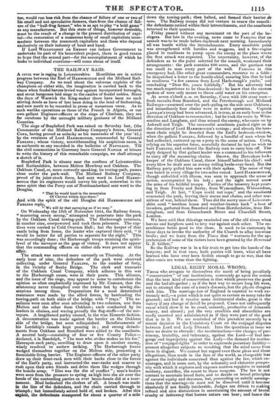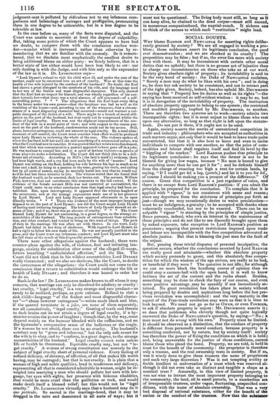LEGAL RIGHT MORAL WRONG.
THOSE who arrogate to themselves the merit of being peculiarly "conservative" of our institutions, commonly go upon the notion that the best kind of conservation is that which preserves the good and the bad altogether ; as if the best way to secure long life were, not to attempt the cure of a man's diseases, lest the physic disagree with him. The marriage-law of England is vaunted to work ex- tremely well,—a point which is not quite so certain as many take for granted ; and lest it receive some detrimental shake, great is the outcry if any change of detail be proposed. Cases not unfrequently occur which show it to be cruel, unmanly, productive of domestic misery, and absurd ; yet the very cruelties and absurdities are coolly asserted and administered as if they were part of the good that is in it. We are reminded of this prevalent anomaly by a recent decision in the Consistory Court on the conjugal disputes between Lord and Lady DYSART. Into the questions at issue we have no desire to obtrude : the recriminations—the charges of par- simony, brutality, and indecency, against the Lord—of foul lan- guage and impropriety against the Lady—the demand for restitu- tion of "conjugal rights" in order to supersede pecuniary liability— present altogether subjects so revolting that the mind turns from them in disgust. We cannot but regard even these pleas and these allegations, thus made in the face of the world, as chargeable less against the individuals concerned than against the law, which en- courages, and in some sort, by the solemnity and elaborate pompo- sity with which it explores and exposes matters repulsive to natural modesty, sanctifies, the resort to these weapons. The law, is not content to ascertain broad facts, and to decide on broad principles of natural equity and decorum, but, proceeding on subtile assump- tions that the marriage-tie must not be dissolved until it become absolutely if not fatally intolerable, Judges are driven to making refined and nice distinctions in ascertaining the amount of brutal cruelty or indecency that human nature can bear; and hence the
judgment-seat is polluted by ridiculous not to say infamous corn- pansons and balancings of outrages and profligacies, pronouncing them in one degree to be unbearable, but in a less degree to be tolerable at law.
In the case before us, many of the facts were disputed, and the Court was unable to ascertain at least the degree of culpability. But, taking some points of which the Court appears to have had no doubt, to compare them with the conclusion excites won- der—wonder which is increased rather than otherwise by re- membering that we are familiar with the anomaly. Be it remem- bered, that we disclaim most emphatically the smallest desire to bring additional blame on either party : we firmly believe, that in a better state of law either would have been less likely to err : our only dealing is with the Judge, and with him only as the expounder of the law as it is. Dr. LUSHINGTON says-
" Lord Dysart's refusal to visit his child when ill, and under the care of the mother, could not be construed into an act of cruelty. Was at this time the health of the wife injured by the conduct of the husband ? No doubt, the Earl bad shown a great disregard to the comforts of his wife, and the language used to her was of the foulest and most disgraceful character. This only showed that the Earl had no respect for himself, and was wholly regardless of his con- duct towards her—that there was a total absence of self-command—of a self- controlling power. • • • The allegations that the Earl kept every thing in the house under his own power—that the furniture was bad as well as the condition of the house—and, according to one of the witnesses, that a circum- stance of a most disgusting character had occurred—would not warrant a cul- ipable disregard of the duties of a wife. There might he a breach of moral obli- gation on the part of the husband, but that could not be compressed within the iimits of legal cruelty. There was not the slightest impeachment of the con- duct of the wife in a moral point of view ; and with respect to the course pur- sued on the part of the husband, condemnation could not be too severe. Still, abuse, however outrageous, could not amount to legal cruelty. By a total aban- donment of self-control, the Court must consider what effect would be produced upon Lady Dysart in reviewing the whole of the case. The violence spoken of, when the husband held her until she said something of a nonsensical nature, was what the Court bad now to consider. It was proved that her wrists were discoloured, and that which was commenced in a quarrel appeared to have gone off in ajoke. lie was anxious to compel her, and in a spirit of lawless violence—a species of cross play—to make a declaration. The Court did not think this to be a deli- berate act of cruelty. According to Dill's [the lady's maid's] evidence, there bad been high words, and a cry had been made by the wife of murder.' Lord Dysart was sitting on the floor, holding his wife between his legs as much as an hour and a half, he being in a passion at the time, grating his teeth, and calling her by all sorts of names, saying he mortally hated her, and that he would say so if he had but three minutes to live. The witness stated that she feared that the husband would, as he asserted, dash her brains out. The servant, William rick, however, does not corroborate this statement to the full extent. If the evidence of the female servant Hills was not corrected or contradicted, the Court could come to no other conclusion than that legal cruelty had been es- tablished. But, upon interrogatory, it appeared that the witness laughed at the occurrence, and at the strange expressions made use of in her presence by Lord Dysart. Lord and Lady Dysart appeared afterwards to be upon friendly terms. * • " There was evidence of the most improper language deposed to on the part of Lord Dysart ; nor did the Court acquit Lady Dysart of having used irritating language. The letters of Lady Dysart showed an ab- sence of fear; and if so, there was an absence of cruelty. * * The Court blamed Lady Dysart for not conforming, in a great degree, to the strange ec- centricities of the husband. The long periods of estrangement from cohabita- tion, and other conduct, had tended to bring on this state of things. The path of duty in the marriage life was often set with thorns. In one word, Lady Dysart had failed in her duty of obedience. With regard to Lord Dysart, be bad a right to follow his own mode of life. He was not morally justified in the gross, and the Court must say infamous, conduct; and Lord Dysart must take his full share of the result of this d:sgraceful proceeding." There were other allegations against the husband; there were counter-pleas against the wife, of violence, foul and irritating lan- guage, anxiety for cohabitation after some of the alleged ill-usage, letters breathing " undiminished affection," and the like. The Court did not think that in his wildest eccentricities Lord DYSART really threatened ; and we also are desirous, like the Court, to doubt the correctness of the allegations : the Court could not come to the conclusion that a return to cohabitation would endanger the life or health of Lady DYSART ; and therefore it was bound to order her to do so.
Such is the law ! Dr. LUSHINGTON makes known to all whom it may concern, that marriage can only be dissolved for adultery or cruelly: but cruelty, "legal cruelty," is a very strange and rare product—as rarely to be realized, perhaps, as pure calcium. Refusal to visit a sick child—language "of the foulest and most disgraceful charac- ter "—" abuse however outrageous "—wrists made black and blue, if the quarrel terminate in a joke, are none of them separately, nor all cumulatively, "legal cruelty." Grating of teeth and threats to dash brains out do not attain a degree of legal cruelty, if a by- stander retains the power of laughter ; though that, by the way, must depend mainly on the humour blended with the ruffianism, and on the bystander's comparative sense of the ludicrous or the tragic. If a woman be not afraid, there can be no cruelty. The husband's ,conduct may be "gross and infamous," but the only safe resort for the wife is to obey, and to "conform, in a great degree, to the strange eccentricities of the husband." Legal cruelty cannot exist unless life or health be threatened. Equitable cruelty may, but not "le- gal cruelty." A woman of strong constitution can scarcely be the subject of legal cruelty short of personal violence. Every feeling of refined delicacy, of decency, of affection, of all that makes life worth having, may be outraged; but that is not cruelty. It is plain that a woman of high and noble qualities, bred in tenderness and delicacy, representing all that is considered admirable in woman, might be in- veigled into marrying a man who should pollute her ears with lan- guage, her eyes with sights her presence with hideous ribaldries, that would be more cruel Lan the guillotine or rack, and would make death itself a blessed relief; but this would not be "legal cruelty." Dr. LUSHINGTON virtually says that a husband may do it suo periculo. So sacred is the marriage-bond, that it may be dragged in the mire and desecrated in all sorts of ways ; but it
must not be questioned. The living body must still, so long as it can keep alive, be chained to the dead corpse—must still ascend, in monstrous companionhood, the nuptial-couch. It sickens one to think of the scenes to which such "restitution" might lead.



























 Previous page
Previous page